Written specially for Vikalp Sangam
About Farm2Food
Organic farming, nutrition and education are the three pillars of a prosperous society, centred on which Farm2Food is empowering tomorrow’s youth and women, in Assam’s rural areas. Farm2Food is a non-profit social enterprise, based in the Jorhat district of Assam, which works closely with government schools and local communities to promote sustainable farm-based livelihoods. They act as facilitators in providing training, tools and knowledge in farm and food entrepreneurship. Their flagship programme ‘Farm Preneur’ aims to impart life skills through education at nutrition gardens set up in schools. The nutrition gardens act as Science and Mathematics laboratories, where principles and concepts learnt in classrooms are applied in the process of organic farming with the help of teachers at the school. Captivated students then turn up at school more often than before. A wholesome meal is also ensured – as the vegetable produce from the garden is used in mid-day meals – resulting in improved academic performance. To create a supportive ecosystem for health and education, students are also facilitated to organise beej daan yatra (seed donation drive) during which village elders share seeds of local indigenous crops and tips for growing them; thereby, sharing traditional knowledge – gyaan daan taking place. Later on, parents do shram daan, i.e., voluntarily contribute labour and mentor their children in these farm-based activities to enrich their learning further.
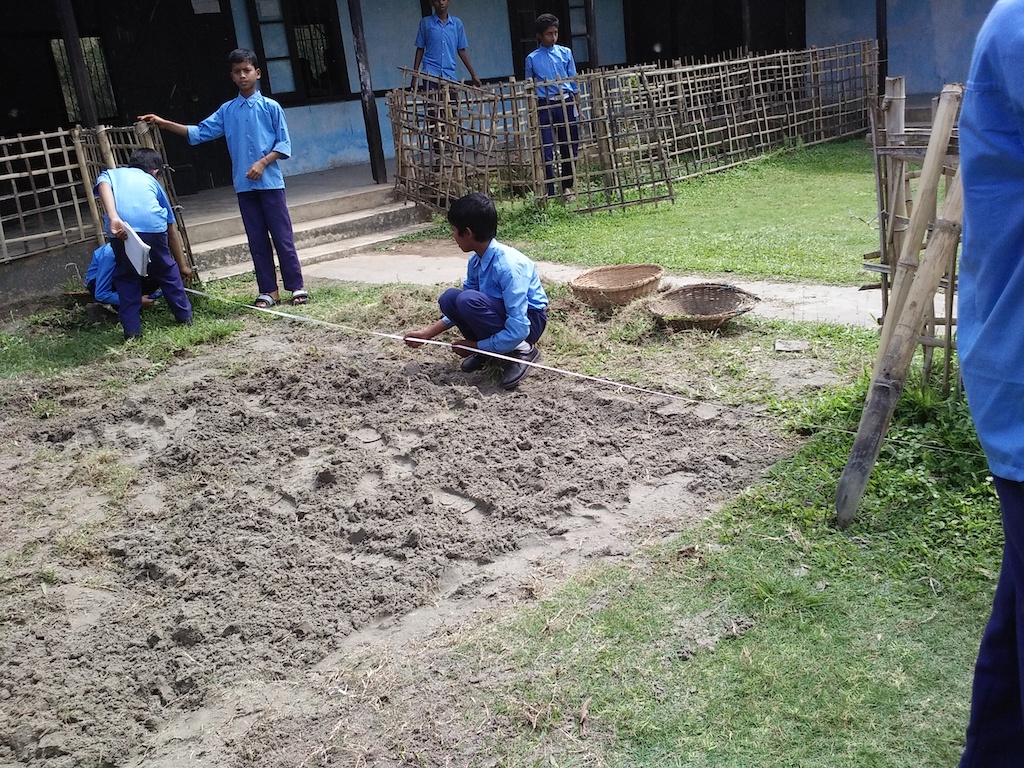
Photo 1: Students of Jagannath Baruah school taking measurements to make a raised bed. Photo Credit: Udeshna Konwar
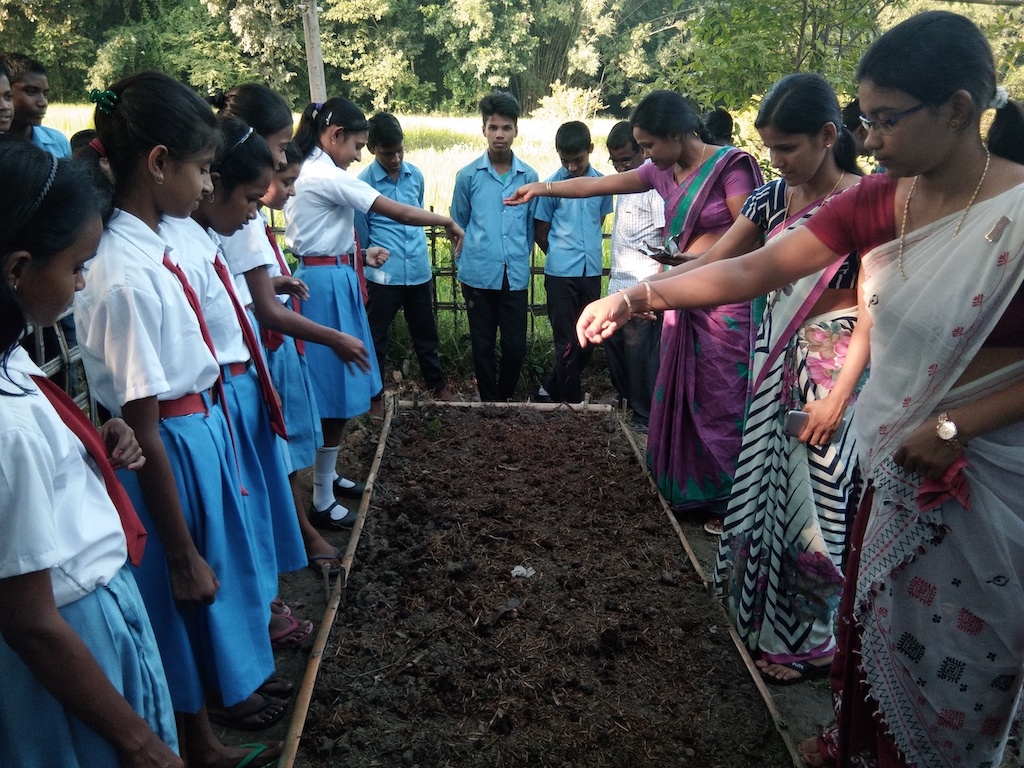
Photo 2: Students with their teachers at Sanmilita High school. These beds, for the nutrition gardens, are made in square, circular and rectangular shapes to teach students about important mathematical concepts like shapes, area, perimeter and so on. Photo Credit: Sunil Saikia
Besides schools, Farm2Food is working with the local community by engaging mothers to set up nutrition gardens in homes and enabling them to start small-scale sustainable agri-businesses such as vermi-compost preparation for commercial sale. This is achieved by forming various mothers’ self-help groups (SHGs). The Farm Preneur and the Mother’s Group Projects are, however, being conducted only with children from standards 6,7 and 8 and their families. Additionally, a program called ‘Solve Ninjas’ is being conducted with middle-school students to make them responsible for their environment and help them become change-makers in their own schools and communities. Another program called ‘Jagrik’ is being overseen with the aim to make the youth more socially aware by enlightening them about their fundamental rights, duties as well as the values that have been laid down in the Indian Constitution. Furthermore, there are activities to fight discrimination in society and help children develop more inclusive attitudes.
‘Farm and Agri’preneur
Rural parts of Assam are majorly an agrarian economy, “and 70-80 per cent people depend on agriculture,” explained Chandan Nath, headmaster of Sanmilita High School. “Every household engages in farming. They rear cows, goats and chicken. Almost 40 per cent of households have small tea plantations. Some have bamboo production too,” Nath explained further. “Some are teachers, some are nurses, some have bank jobs; but most people engage in farming, even we do. To stay alive, we have to eat and if we don’t farm then what will we eat!” added Babita Bora whose husband, Bhairab Bora, is a teacher at Khanikar Utsav Buniyadi Bidyalaya, a government school.
Trishna Saikia, who is a class X student at Girls High School in Appupam village, explained in great detail how a vermi-compost box is prepared by reusing a discarded polystyrene fish box. “One polystyrene box of vermi-compost yields 15 kilograms of compost in 40 days which is sold at Rs. 10 per kilogram,” said Sunil Saikia, a program coordinator with Farm2Food for the last seven years, and that, “The money that comes from the sale of vermi-compost can cover some educational expenses.” Trishna’s father, Ajit Saikia, further corroborated these statements by saying, “Money is saved by growing vegetables and fruits at home. Any extra vegetable is also sold to neighbours or to traders. Vermi-compost also need not be bought from the market anymore as it is being made at home. Rice grown by using vermi-compost is also tastier.” Ajit Saikia is a farmer who works at a tea garden and also has another farm where he grows rice and vegetables.
Vegetables from the nutrition garden are also sold to the school for the preparation of mid-day meals. “Each child earns around Re. 1 for vegetables from Rs. 6 given per meal per child by the government,” said Deepjyoti Sonu Brahma, the co-founder of Farm2Food. Though the money is not a lot, it is compulsory that this money goes into their bank accounts, which he stresses, “is important for entrepreneurship that a good financial acumen is developed early on.” Farm2Food facilitates children to open bank accounts in their own name with the help of their parents.
Headmaster Nath understands how important these skills are. “Bookish knowledge is not sufficient for practical life,” he emphasized when asked about what motivated his school to collaborate with Farm2Food. Sunil Saikia believes that the techniques they use, such as, raised beds to farm in less space, use of discarded polystyrene boxes for composting and so on, need to be shared with the local populations, many of whom are below the poverty line and might not have access to such information to improve their economic status. Partha Protim Bordoloi, another program coordinator with Farm2Food, feels that it is vital that nutritional status among children and their families be improved for better academic performance, otherwise it is often seen that “they cannot go far in life,” get involved in anti-social activities and are unemployed. Both Sunil Saikia (who previously worked on the Sarva Siksha Abhiyan) and Partha Bordoloi (who has studied the food habits and nutritional status among tea garden communities) believe in the role of outdoor, fun and life skill imparting educational activities in bridging the above gaps. They both enjoy their work with children as well.
COVID-19 and Homestead Gardens
Babita Bora took extreme pride in pointing out that children, including her daughter Anushka, who is a student of class VIII, took part in science exhibitions; where her daughter had presented her own scientific project. But that is not the only kind of projects that Anushka has undertaken. Anushka and her classmate Shubhankar Dutta along with many more children[1] tended to homestead gardens during the Covid 19 induced lockdown. Harvests from their gardens not only sufficed the nutritional needs of their families but were also sold to generate income during the lockdown. “We first learnt organic farming using raised beds in our schools and then started it at home,” said Anushka and Shubhankar. Anushka further expressed how proud she felt that she did all this farming at home by herself and that since it was completely organic it was good for health too. Both Anushka and Shubhankar want to have careers when they grow up and do farming side by side. All this was possible as the children suddenly had a lot of time in their hands to invest in their gardens, due to the lockdown. Shubhankar also spoke of the plight of many daily wage labourers who had to stay back at home as there were no jobs available due to the complete shutdown of the economy. However, Partha Bordoloi pointed out that in some cases there was an opportunity in this distress too, as the labourers then used this extra time to start homestead gardens that they could not take care of earlier.
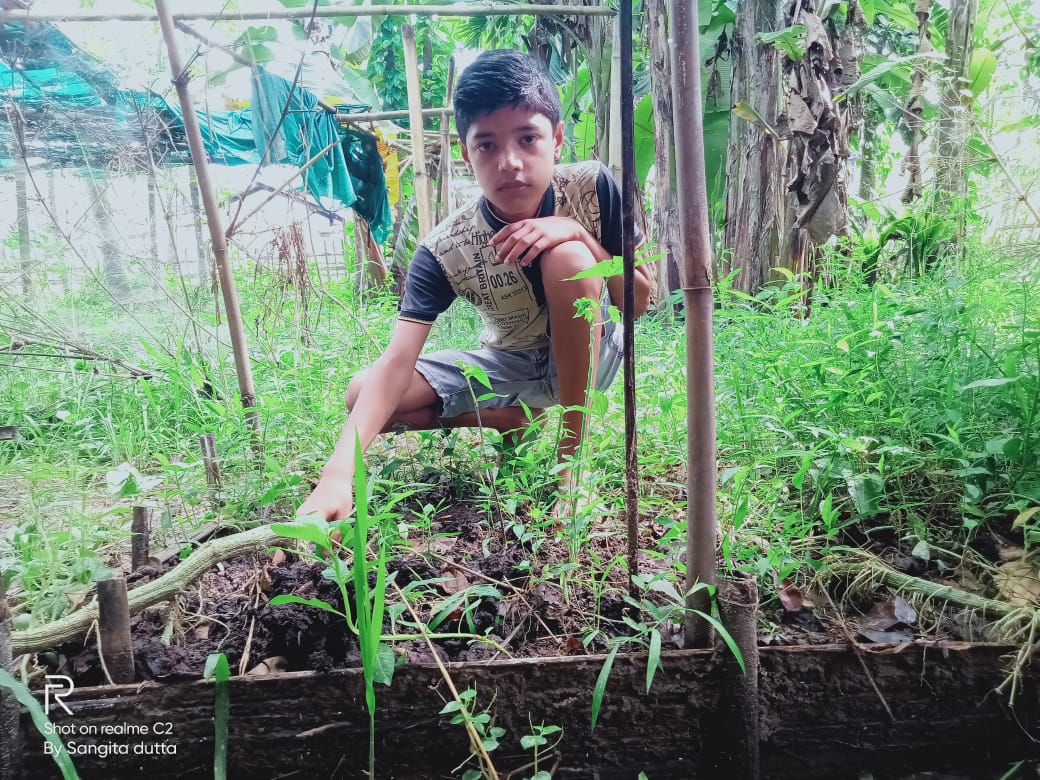
Photo 3: Shubhankar Dutta a student of class VIII from Khanikar village at his homestead garden. Photo credit: Sangita Dutta
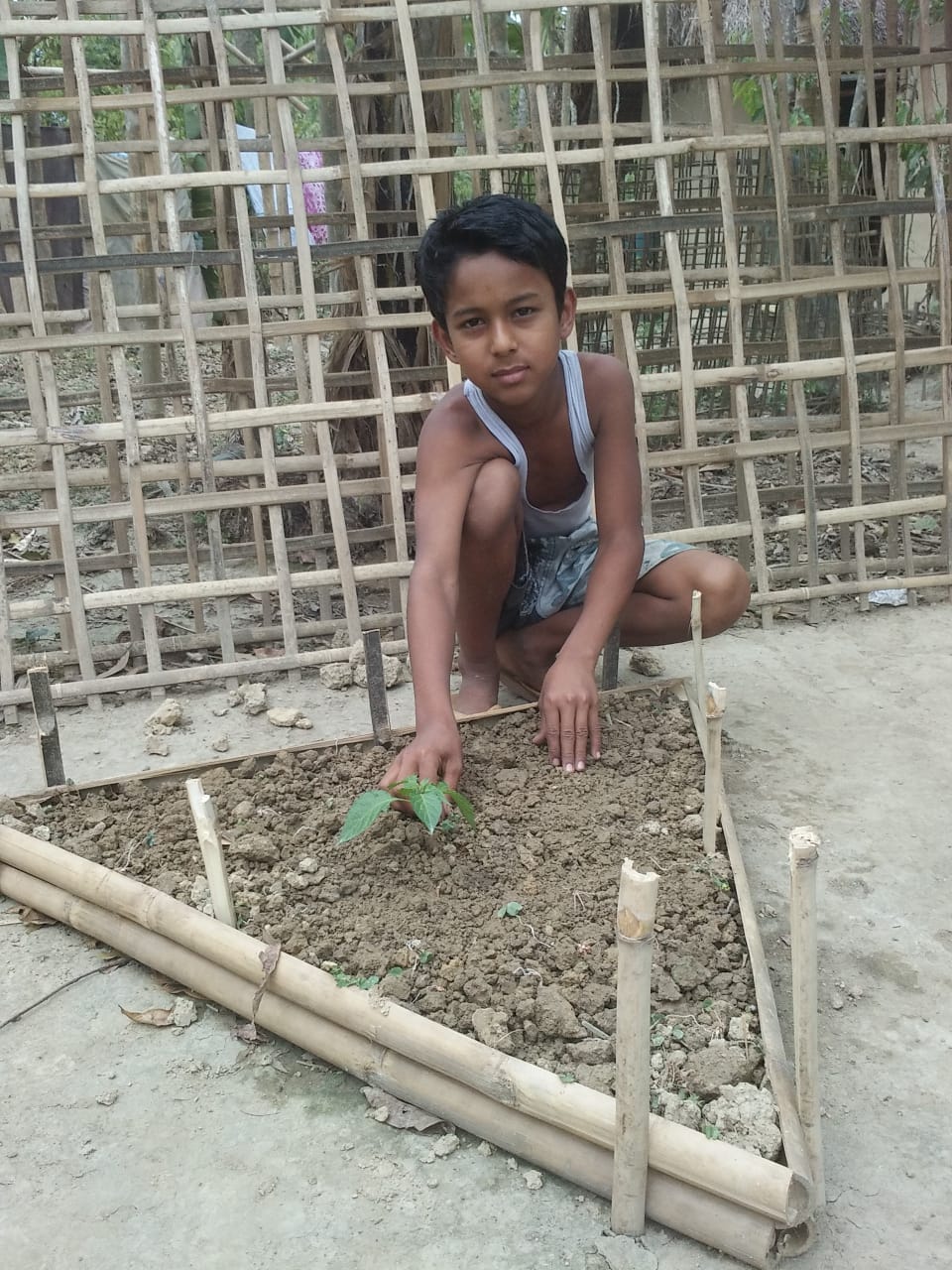
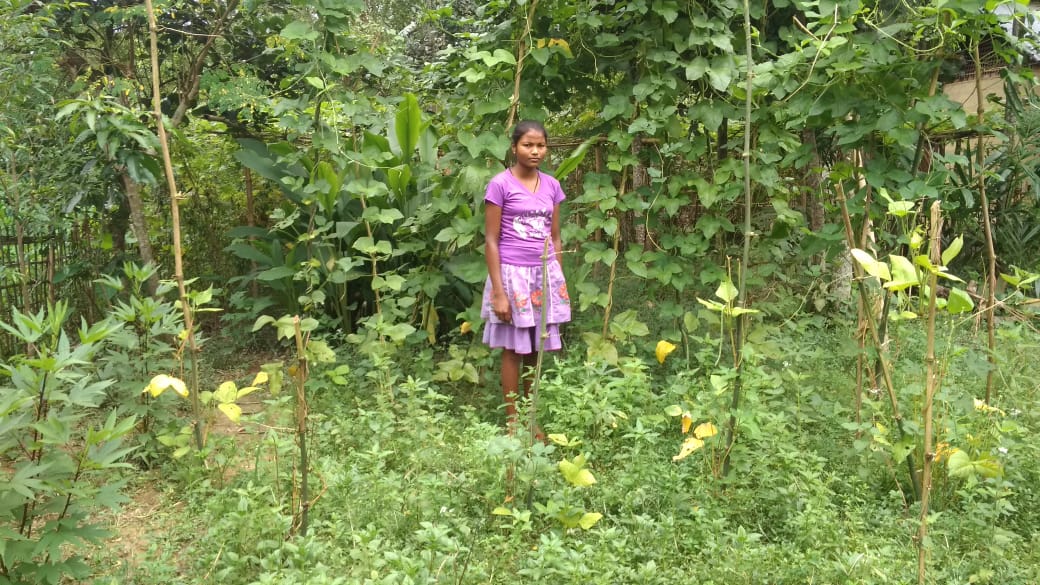
Photos 4 and 5: Biswajit Hazarika a student of class VIII from Dhubwuni village and Sunita Gonju a student of class IX from Mohanating village, respectively, at their homestead gardens
For the homestead gardens, children received support from their parents and their mentors from Farm2Food. The mentors also did a number of activities for psychosocial support of children during the lockdown. These activities ranged from learning 15 new words everyday about the Indian Constitution, sticking posters in the neighbourhood with useful information related to the coronavirus pandemic to providing food to people and animals in need and reusing waste materials to make something. Anushka said she didn’t feel bored at all during the lockdown when schools were closed as “I kept doing something or the other like drawing, farming etc.” “Children could be stressed, depressed or have anxiety,” explained Partha Bordoloi as the lockdown worsened the financial troubles that some poor households faced and ruined the atmosphere at homes. Supporting children academically also went on during this period, as online classes were being held regularly.
Astounding as it might sound, since its inception in 2011, Farm2Food has worked with 446 schools across several districts in Assam, with participation from 8920 students and impacting a total of 30000 students[2]. In December 2018, 30 government schools had sold around 500 kilograms of organic vegetables[3]. In February 2019, a mother’s group from Malowkhat village sold more than 2,100 kilograms of vermi-compost[4]. It is not surprising then to know that about 79 per cent of the emerging farmers are women[5] out of which many are agri-entrepreneurs. Farm2Food has also managed to extend its presence in several other states, like Meghalaya and Delhi, through partnerships and capacity building. There, schools are running the Farm Preneur program after contextualising it in their curriculums.
Assam has a fragile economy and ecology as native populations are in a constant state of conflict, there is regular out migration for work, food is imported from neighbouring states, floods ravage livelihoods and monocropping of tea has led to extensive loss in biodiversity. Under such circumstances, Farm2food is working with some of the most disadvantaged communities in Assam’s rural districts – the tea garden worker’s, mishing (indigenous), scheduled castes and Muslim communities – with a larger vision to build a North-East that is unshackled, prosperous, self-reliant and peaceful. Farm2Food’s work in Assam has transformative potential on multiple fronts: ecological – by engaging in organic farming and reviving indigenous crop varieties; social – by uplifting educational and nutritive status of marginalised groups; economic – by creating an army of ‘farm and agri’preneurs; and cultural – by keeping traditional knowledge alive.
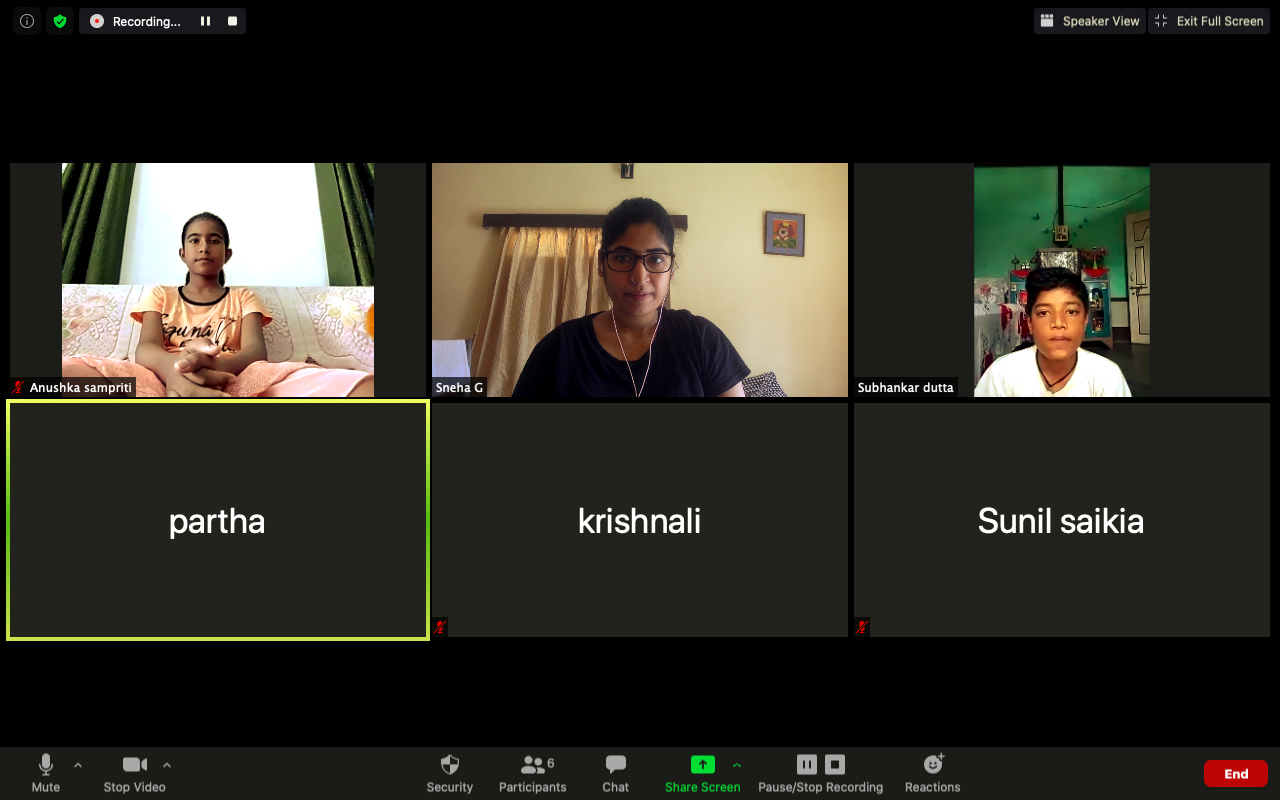
Photo 6: A zoom meeting in progress with students – Anushka Bora, Shubhankar Dutta and co-ordinators from Farm2Food – Partha Protim Bordoloi, Krishnali Hazarika and Sunil Saikia. Photo credit: Sneha Gutgutia
*Sneha Gutgutia is a member of Kalpavriksh, Pune and is currently pursuing a PhD at National Institute of Advanced Studies, Bengaluru. Contact her